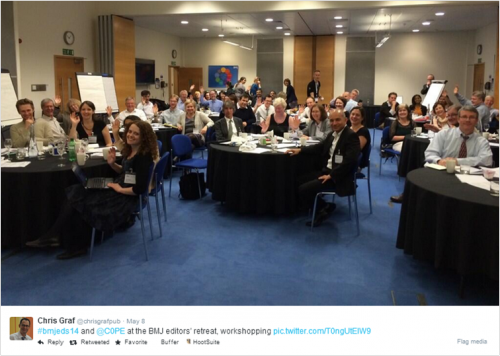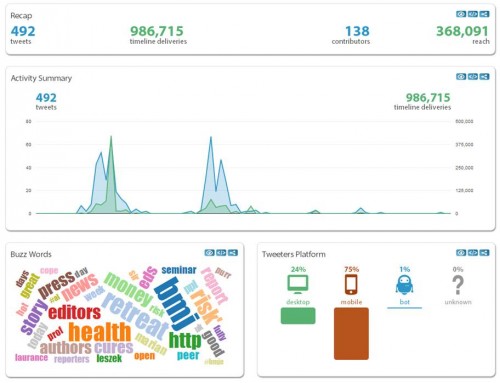BMJ Editors’ Retreat: the certainty principle
12 May, 14 | by BMJ
Each year, BMJ invites the editors of its specialist journals to gather at BMA House and discuss the hottest issues affecting medical publishing. The first day of the retreat included presentations from Professor Sir Leszek Borysiewicz, Vice-Chancellor of the University of Cambridge; Sir Muir Gray, Director of Better Value Healthcare; and Jeremy Laurance, The Independent. There was also a lively discussion regarding impact metrics between Marian Hollingsworth of Thomson Reuters and Euan Adie of Almetric.com.
Pippa Smart, publishing consultant, led the second day of the retreat, covering topics such as making the news, publication ethics with Chris Graf of COPE, incentivising reviewers and reaching new audiences. She has written the following synopsis:
————————————————————————————————————–
Get a group of medical editors together in a room, and what do they talk about? (I’m sure there is a joke there somewhere.) It was the second day of the BMJ editors’ retreat and feedback, comments, opinions and challenges were coming across fast and furious. It was an interesting day all round, with plenty of discussion, some disagreement and plenty of cynicism to lighten the debates. From these meetings people take away different things, and for me the highlight of all the discussions was the importance of editorial certainty in an uncertain world.
As a member of the public, and at the receiving end of the medical profession I really, really want certainty. I want my doctors to use tried, tested and accredited protocols and drugs: when I read the papers I want to believe their news items. However, I’m aware that real life, and scientific research, is a lot messier than this.
What editors are faced with every day is a mass of uncertainty. Both articles and authors can prove to be a disappointment – because of a mismatch of what is important and interesting, because of human error, and because they sometimes – frankly – cheat. Awareness of this didn’t however, dent the enthusiasm and energy of most of the participating editors at this meeting – they remained committed to certainty, and adamant in the face of opposing views that couldn’t be backed up with hard evidence.
So when it comes to what should be Press Released they were vehemently opposed to earning “a fast buck” on the back of a dodgy article or a sexed-up news report. (I remember with fondness the supposed life-giving properties of red wine…) When it came to examples of unethical authors they were unanimous in their condemnation (in fact, more draconian than the COPE advice). When it came to peer review they were committed to improving papers, even in the face of unreliable reviewers. And when it came to marketing, they stuck to the importance of making content as error-free, interesting and accessible as possible rather than focusing on sales.
Impressed? Yes I was. Perhaps I am more suspicious of people’s motives and don’t trust in readers’ intellect to the level that this group do. But what impressed me most was not the way that dodgy authors were censored, but the fact that the participants’ editorial certainty was upheld in an environment that they knew comprised uncertainty. Upholding a commitment to absolute values where research may only show partial and relative findings, and where individuals may not provide absolute truths is impressive.
The adherence of these editors to certainty is certainly not unique and I’m always relieved to come across similar values in other editors that I meet. And the principle of certainty and high values was endorsed in the BMJ Awards that took place in the evening of this meeting. Sir Iain Chalmers was honoured for his commitment to transparent clinical trials and research, and his demands for evidence-based medicine (I’m with him on that one). In a world where the press focuses on doom, despair and the occasional titbit of medical information, and where claims and counterclaims seem to bombard the public daily, it is refreshing to know that there is, after all, a backbone of certainty in this shifting landscape – and that it is making a material difference to our health and wellbeing.
In an imperfect world, I take my hat off to them all.
Pippa Smart, Research Communication and Publishing Consultant
————————————————————————————————————–
We used the hashtag #bmjeds14 to capture conversations held over both days. Analytics and a full transcript can be found by clicking the image below:

